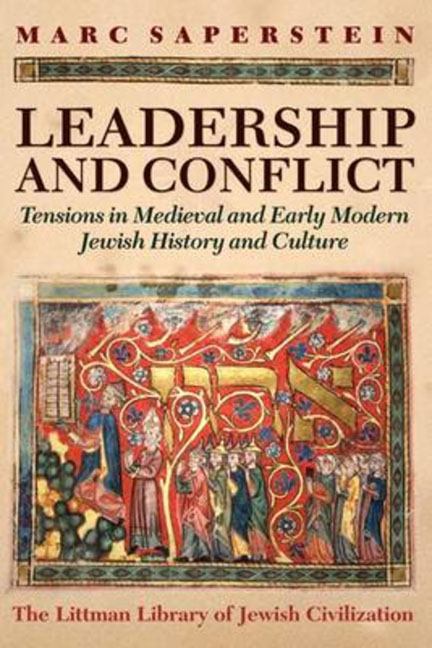Book contents
- Frontmatter
- Dedication
- Acknowledgements
- Contents
- Note on Transliteration
- Introduction
- PART I TWO MODES OF RABBINIC LEADERSHIP
- PART II INTELLECTUAL CHALLENGE AND CONFLICT
- PART III LEADERS FACING COMMUNITIES IN UPHEAVAL
- PART IV CONFLICTING ATTITUDES TOWARDS EXILE, THE LAND, AND THE MESSIAH
- Bibliography
- Index of Passages Cited
- General Index
12 - The Land of Israel in Pre-Modern Jewish Thought: A History of Two Rabbinic Statements
- Frontmatter
- Dedication
- Acknowledgements
- Contents
- Note on Transliteration
- Introduction
- PART I TWO MODES OF RABBINIC LEADERSHIP
- PART II INTELLECTUAL CHALLENGE AND CONFLICT
- PART III LEADERS FACING COMMUNITIES IN UPHEAVAL
- PART IV CONFLICTING ATTITUDES TOWARDS EXILE, THE LAND, AND THE MESSIAH
- Bibliography
- Index of Passages Cited
- General Index
Summary
The Jewish people … forced to leave their ancient country,
has never abandoned, never forsaken, the Holy Land; the Jewish people
has never ceased to be passionate about Zion.
It has always lived in a dialogue with the Holy Land.
THESE WORDS, written by Abraham Joshua Heschel, express a sentiment reiterated by dozens of Jewish thinkers of the past three generations. The passionate attachment of diaspora Jewry to erets yisra’el, the Land of Israel, from the destruction of the Temple at least until the Emancipation, is an ideological axiom shared by the vast majority of contemporary Jews. Why this is so widely assumed to be true might be worthy of a study in itself: it was certainly not the case at the beginning of the twentieth century, when anti- Zionists sought to temper the passion of the attachment through quietistic and universalistic teachings, and Zionist writers berated medieval and contemporary Jews for having made peace with life in galut (exile). This chapter, however, will look at different questions: To what degree does a statement like that of Heschel reflect a demonstrable historical reality? What kinds of source material would be relevant for testing such a statement? How might the statement be documented or proven? How is the role of the Land of Israel in Jewish thought and consciousness from 70 to 1800 to be evaluated?
The technique most frequently employed for this purpose is not especially fruitful. It is the method of anthology, the collection of sources from all periods and genres of Hebrew literature which praise the merits of the Land of Israel, emphasize the importance of living there, articulate yearnings for its holy places, and so forth. Such collections generally remove the passages from their historical and literary context and present them without any indication of opposing viewpoints or analysis of what they might really mean: they are at best a starting point, and at worst they are biased distortions.
- Type
- Chapter
- Information
- Leadership and ConflictTensions in Medieval and Modern Jewish History and Culture, pp. 271 - 290Publisher: Liverpool University PressPrint publication year: 2014



